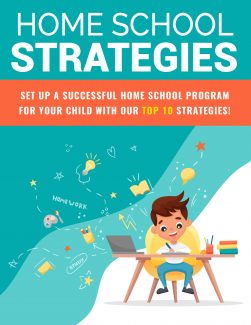 License Type: Private Label Rights
License Type: Private Label Rights  File Type: ZIP
File Type: ZIP
 SKU: 63522
SKU: 63522  Shipping: Online Download
Shipping: Online Download
Sample Content Preview
Introduction
Regardless of your reasons for wanting to home school, one of the questions that is probably burning in your mind is:
Do I have what it takes to be an effective teacher?
Will your children buckle down and get the work done? Can you get rid of the distractions in their lives so they can learn and focus more easily? How do you separate family time from school time so it’s well balanced?
And how will you still find time to complete your own personal tasks each day while still being available to your child?
One of the first things you need to keep in mind is to be a parent first and an educator second. Your kids are going to need Mom or Dad to love them, listen to them, and play with them.
Yes, you can do these things while they’re learning once you get the hang of things, but have those as your priorities, especially when you’re just starting out. That doesn’t mean school isn’t as important, but it does mean they need to realize that first of all, you’re Mom or Dad (or Grandma, Grandpa, whatever the case may be J.
They should feel free to come to you with their problems instead of worrying you’ll get upset or frustrated because they need extra help.
Remember, this is a transition for both you and your child and it will require commitment, dedication and above all else, patience!
Home School Strategies: Special Report 7
Here are ten tips you can follow that will allow you to home school without losing your marbles.
Let’s begin!
Create a Reasonable Plan
In order to be successful with home schooling your child, you need to create a plan of action. Your child’s school may be able to provide you with a curriculum you can follow. This might include worksheets, workbooks, or educational websites your child will need to use in order to complete specific tasks or assignments.
If you’re lucky enough to have the school’s help, your main job will be to make sure everyone’s participating, everything’s getting done on time, and everyone understands the lessons.
If your school isn’t all that involved, don’t panic. Yes, you’ll be making up your own lesson plans, but you’ll still have plenty of help. You want to base your plans around your child’s grade level, their skills and abilities, and on the work they were doing at school (if you can find that out).
Run a Google search for your child’s grade level and your State’s Board of Education to find learning goals for each of their subjects. You’ll want to concentrate on “The Three R’s” (reading, writing, and arithmetic AKA language arts and math) of course, but remember not to neglect the other courses. Your child will benefit from a solid knowledge of science or history, as well as the creativity taught by the arts.
There are plenty of online sources that can help as well. You can download entire textbooks, worksheets, workbooks, and lesson plans. You can also get involved in Facebook groups dedicated to home schooling, if you need help or feel you’d benefit from the encouragement from other parents who may be facing the same challenges.
In addition, use Google to find language and math websites that offer online lessons or extra learning practice. Your local library can also be a lifesaver. Get to know your librarian and find out what kinds of resources they may offer!
Talk to your child’s public school teachers and find out where they obtain the materials they use to teach with. There are plenty of good resources you can use in your classroom, and we’ll talk about some of them in this special report. Teachers can help you learn where to find these resources and which ones will actually work.
One thing about lesson plans: make sure your objectives are something concrete that you can measure.
For example, you want them to “be able to count to ten” instead of “be able to know addition,” to “recite a short poem” instead of “appreciate poetry.”
Establish a Daily Routine
You’re probably not going to be able to schedule a routine in the same way the public school did, however it’s important that you create some sort of structure that will make it easier on both you and your child.
Establishing a routine will help your child know what to expect, it’ll help you plan out your day so you have the time you need for your own work or activities, and it will create a clear divide between personal time and school time (which will help your child stay focused!)
It’s usually best to take care of your schedule first, then see where the homeschooling will fit into that. That way you’re focused and able to dedicate the time to helping your child with their school work, free from distraction.
When you’re homeschooling, it’s important that you and your kids follow a bedtime and wake-up routine as well. They should try to wake up at the same time every day and change into “work clothes” instead of lounging around in their pajamas. That way your child is retaining a similar schedule and routine that they did when they were attending school.
You, too, should lead by example, being dressed and ready in time for classes. Create a daily routine that everyone follows. You won’t have the traditional 8:00 to 3:00 schedule (with recess between classes!) but you should have some sort of set routine. School begins and ends on time, and you’ll be working during that time, not playing with cellphones or listening to the TV in the other room. Your child will only be as invested as you are!
Remember, younger kids and teens need at least 10 hours of sleep in order to perform at their best. And sadly, most kids (and their parents!) are chronically sleep-deprived, which makes a big difference in their ability to learn. So, try to get them to bed at a decent hour so they can get that much-needed rest.
Having a set daily routine benefits everyone in the family. Your kids will get used to being “in school” at a certain time and will therefore be far more focused and ready to learn.
You will also have the ability to plan your day more effectively and utilizing your time the best way possible. In addition, it’s a lot easier to work diligently based on a set schedule or daily plan, than just to “wing it”.
Assign a Dedicated Learning Space
You already know how easily kids can get distracted. If you’re lucky enough to have a separate room you can use for school, that’s fantastic. If, like most of us, you’re forced to work in a corner of the living room, work with what you’ve got! It’s totally okay: the goal is to assign a dedicated learning space and stick with it.
That way, your kids know that once they’re within that area, it’s time to get to work.
You’ll need somewhere for everyone to sit where they can spread their work out and write or work online. The kitchen or dining room table will work, as will a desk, if they have one. If you’ve got several kids and only one computer, of course, they’re going to have to take turns with that. But if you’ve got enough tablets or laptops for everyone, even better!
Note: if your kid would rather sprawl on the floor to work, that’s fine too. Whatever gets the job done. Don’t forget to save a place for the teacher. J
If you can’t spare the table for the entire duration of the homeschool day (maybe you need to prepare lunch or use the desk for a teleconference), get a basket for the school supplies and let the kids carry them to a secondary space, but whenever possible, staying within a space dedicated to school work will help them stay focused.
You’ll also want to do your best to eliminate distractions. Turn the TV and cellphones off (you should probably put the phones away completely so they’re not even tempted).
Make sure the pets are excluded from the room. Tell your friends and coworkers what time you’re teaching so they don’t interrupt with calls or visits.
If you’d like some background music, science has shown that soft instrumental music helps kids concentrate best (no lyrics or heavy beats).
You might even want to put up a “Work in Progress” sign like you see in offices so that other family members know not to disturb you when “school” is in session. Write out the times you’ll be holding class each day and add “Do Not Disturb” to the sign.
If everyone knows that this is the designated school room, you’re far more likely to get a good day’s work out of your students. Prepare Your Learning Tools
You’ll want to do your best to stay very organized when home schooling. Have everything you and your children will need ready to go every day.








